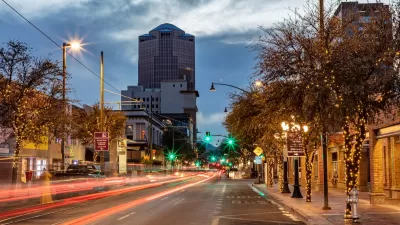Herb Caudill explains why the need to plan for a range of transportation modes and uses of space in urban environs is common sense - not part of a concerted assault on cars.
"The central fact about cars, from a planner's perspective, is that they
take up space. Lots of space. And this matters because space in cities
(a.k.a real estate) is scarce and therefore expensive." So says Caudill, who argues why the need for cities to rethink their relationship to the automobile derives from this simple fact, and not from a philosophical or moral argument against cars.
According to Caudill, our efforts over the past century to accommodate the growing space requirements of the automobile - with more freeways, more roads, and more parking - has failed for two primary reasons. "First," he says, "you can never build enough...Second, when you do make more space for cars you quickly start to
crowd out any other potential mode of transportation, especially
walking. All those parking lots and freeways and roads spread everything
else out so that the distances become too great for walking."
Because owning and driving an automobile isn't an option for everyone (in D.C., 1/3 of residents live in a car-less household), planning for the car effectively discriminates against a significant part of the population.
"So we have to take steps to increase the market share of
non-driving modes of transportation," concludes Caudill. "That's not a pro-car policy or an
anti-car policy, it's just a sensible response to the way the world is."
FULL STORY: Cutting dependence on cars isn't anti-car, it's common sense

Planetizen Federal Action Tracker
A weekly monitor of how Trump’s orders and actions are impacting planners and planning in America.

Chicago’s Ghost Rails
Just beneath the surface of the modern city lie the remnants of its expansive early 20th-century streetcar system.

San Antonio and Austin are Fusing Into one Massive Megaregion
The region spanning the two central Texas cities is growing fast, posing challenges for local infrastructure and water supplies.

Since Zion's Shuttles Went Electric “The Smog is Gone”
Visitors to Zion National Park can enjoy the canyon via the nation’s first fully electric park shuttle system.

Trump Distributing DOT Safety Funds at 1/10 Rate of Biden
Funds for Safe Streets and other transportation safety and equity programs are being held up by administrative reviews and conflicts with the Trump administration’s priorities.

German Cities Subsidize Taxis for Women Amid Wave of Violence
Free or low-cost taxi rides can help women navigate cities more safely, but critics say the programs don't address the root causes of violence against women.
Urban Design for Planners 1: Software Tools
This six-course series explores essential urban design concepts using open source software and equips planners with the tools they need to participate fully in the urban design process.
Planning for Universal Design
Learn the tools for implementing Universal Design in planning regulations.
planning NEXT
Appalachian Highlands Housing Partners
Mpact (founded as Rail~Volution)
City of Camden Redevelopment Agency
City of Astoria
City of Portland
City of Laramie





























